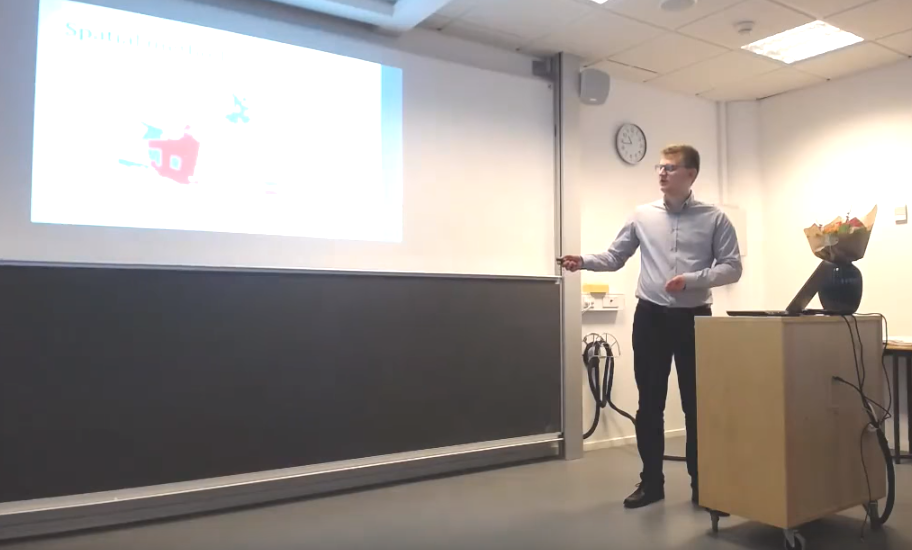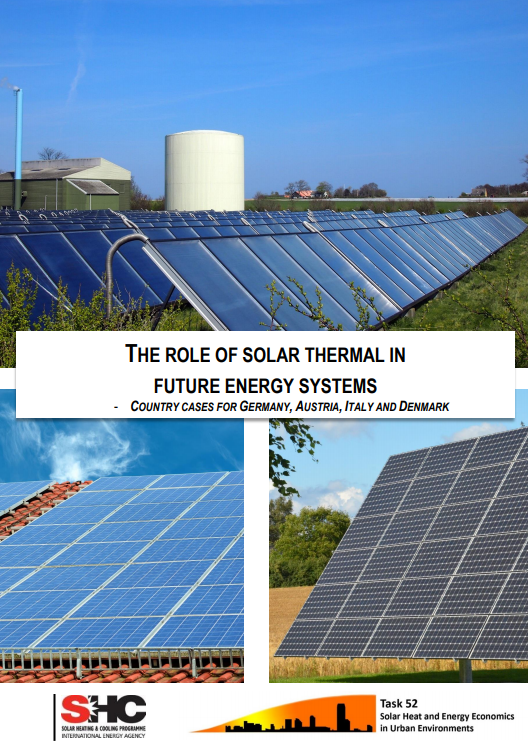News Archive
PhD fellow Dorte Skaarup Østergaard defends her thesis on low-temperature district heating
Dorte Skaarup Østergaard defended her PhD thesis entitled "Heating of existing buildings by low- temperature district heating”. The defense took place at the Technical University of Denmark on November 8, 2018 at 13:00. The thesis was supervised by Professor, Svend Svendsen.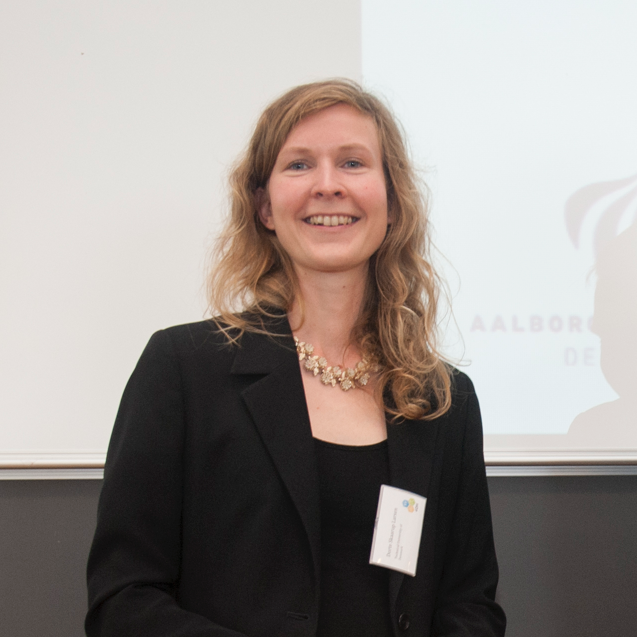
District Heating Potential and a Danish Heat Atlas Based on Metered Heat Demand Data
4DH PhD Fellow Lars Grundahl successfully defended his PhD thesis on the 14th of December 2017.
The thesis investigates the expansion potential of district heating in Denmark under a number of different conditions. Firstly, the economic expansion potential is compared for consumer-economic and socio-economic calculations. The study finds that only approximately half of the potential for each of the economic approaches occur in the same areas. Secondly, the potential is investigated under current conditions and compared to future scenarios with 50% heat savings in space heating and implementation of low-temperature district heating. It is found that low-temperature district heating alone is not enough to mitigate the negative economic impact on district heating arising from substantial heat savings. The implementation of low-temperature district heating has to go hand-in-hand with other measures to improve the economic feasibility of district heating in a future with lower heat demands in buildings.
A new version of the Danish Heat Atlas is developed using the metered heat demand data to estimate the average heat consumption in the different Danish building types. This ensures that heat demand estimates are made individually for all building categories in the Danish Building and Dwelling register. Further, with the new data, it is possible to investigate the accuracy of the heat atlas. This is used to improve the knowledge on how well the heat atlas estimates the actual heat demand depending on the number of buildings included in a sample and across the different building categories.
For more information related to this work, contact Lars Grundahl at This email address is being protected from spambots. You need JavaScript enabled to view it..
New report on the Role of Solar Thermal in Future Energy Systems
A new report on the Role of Solar Thermal in Future Energy Systems was recently published by Aalborg University.
“The role of Solar thermal in Future Energy Systems – Country cases for Germany, Italy, Austria and Denmark” investigates possible roles for solar thermal in future energy systems in these four countries and its main conclusions and recommendations can be summarized as follow:
- The energy system design is crucial in terms of solar thermal feasibility;
- The solar thermal penetration is crucial for the solar thermal potential;
- Based on the analyses in this report the technical solar thermal potential is in the range of 3-12% of the heat production;
- Installing solar thermal could lead to higher energy system socio-economic costs;
- Solar thermal could ease the pressure on scarce renewable resources such as biomass;
- Solar thermal will be competing with other renewable sources in a high-renewable energy system;
- Some advantages of solar thermal decrease in a high-renewable energy system;
- A full energy system perspective is required to analyse the feasibility of solar thermal;
- The findings in this study apply to a variety of energy system types;
- Certain factors might improve the solar thermal feasibility;
- Further research is required regarding the role of solar thermal in future energy systems.
This report is based on research performed by Aalborg University with the collaboration of Subtask A project partners Sebastian Herkel and Andreas Palzer from Fraunhofer ISE, Marcus Hummel and Richard Büchele from the Technical University of Vienna as well as Bengt Perers and Simon Furbo from the Technical University of Denmark. Additional collaboration with other subtask project partners has contributed to enhancing the methodology and reporting of the research. Contributions from Rasmus Lund from Aalborg University are also appreciated.
This report was founded by Danish Energy Agency through the EUDP programme (Energy technology Research and Development programme).
4DH at the EU4Energy Kyiv Policy Forum
4DH was represented by Brian Vad Mathiesen on the EU4Energy Kyiv Policy Forum, on September 25th, 2017, where he gave a presentation about Methods and results of the Heat Roadmap Europe studies: Energy efficiency and renewable energy.
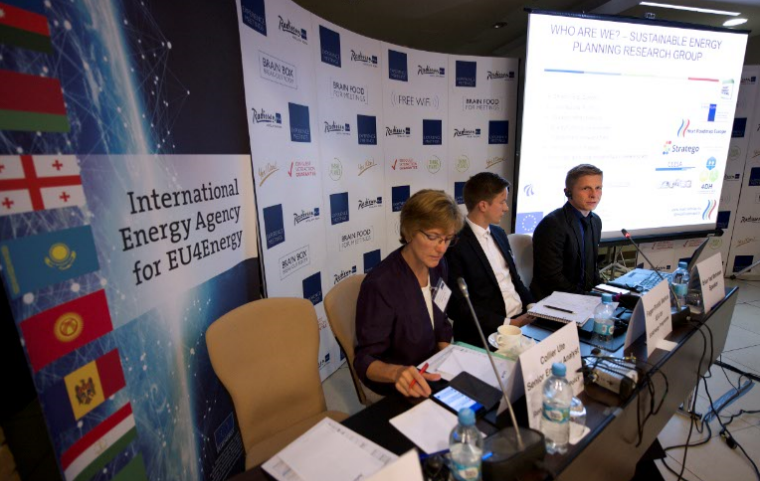
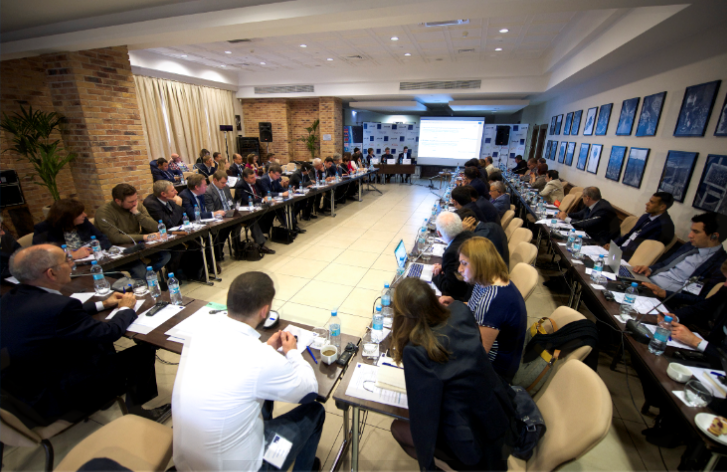
pictures by the EU4Energy Programme
PhD defence: Chapter 1 A of the Heat Supply Act and its Impact upon Municipal Engagemetn in Strategic Energy Planning
Thursday 28th September, 2017 Michael Herborn, from the Department of Law of University of Southern Denmark, successfully defended his PhD thesis entitled: “Chapter 1a of the Heat Supply Act and its Impact Upon Municipal Engagement in Strategic Energy Planning".
His thesis examines the impact of the codification of municipal engagement in the heat supply market upon the ability of municipalities to engage in strategic energy planning in pursuit of transitioning the Danish energy sector to one based entirely upon renewable energy by the year 2050.
According to Michael Herborn, there is perhaps cause for re-evaluating of the basic principles, particularly given that the availability of other technologies for individual heat supply are on the increase. This would though constitute a significant alteration of the policy behind the Heat Supply Act and the laws that are set out in Chapter 4 of the Act in particular, though also planning powers under Chapters 2 and 3. By placing the development of heat planning laws in the context of the series of major statutory interventions that took place in the energy sector in the years following the energy crises of the 1970s, not least the 1979 Heat Supply Act, it can be seen that Denmark locked-in certain technological solutions for the energy sector. Doing so was a conscious planning decision based around the rollout of two particular technologies – district heating and natural gas. Similarly, the promotion of CHP plants, following the 1990 Heat Supply Act, was a conscious policy decision. The same cannot be said of the technological limitations placed upon municipal engagement in the heat sector following the introduction of Chapter 1a. Planning takes place in a continuum and the technologies locked in in the 1970s, 1980s and 1990s were locked in as part of a plan. Given the importance of the transition to a carbon-free energy sector, the time is now ripe to re-evaluate heat supply law in a manner that reflects the changed technologies.

